吉林省吉林市普通高中2013-2014学年高二上学期期末教学质量检测英语试题
- 格式:doc
- 大小:121.00 KB
- 文档页数:14
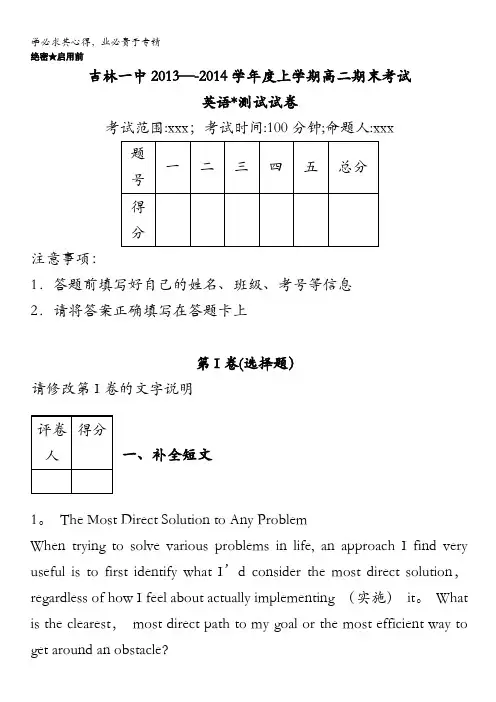
绝密★启用前吉林一中2013—-2014学年度上学期高二期末考试英语*测试试卷考试范围:xxx ;考试时间:100分钟;命题人:xxx注意事项:1.答题前填写好自己的姓名、班级、考号等信息2.请将答案正确填写在答题卡上第I 卷(选择题)请修改第I 卷的文字说明一、补全短文1。
The Most Direct Solution to Any ProblemWhen trying to solve various problems in life, an approach I find very useful is to first identify what I’d consider the most direct solution, regardless of how I feel about actually implementing (实施) it 。
What is the clearest , most direct path to my goal or the most efficient way to get around an obstacle ?Many problems will have multiple direct solutions, but often these solutions will be unpleasant at first glance because they’ll require courage,self—discipline,creativity,or persistence to implement. 1 For example,suppose you want to lose weight。
And suppose we can say that one of direct solutions is to eat the same as you're eating now and increase your exercise output by 500 calories a day. 2 It may require discipline and persistence,but most people would agree that it will work if you follow through.Another example: 3 However, you don’t know how that person feels about you。
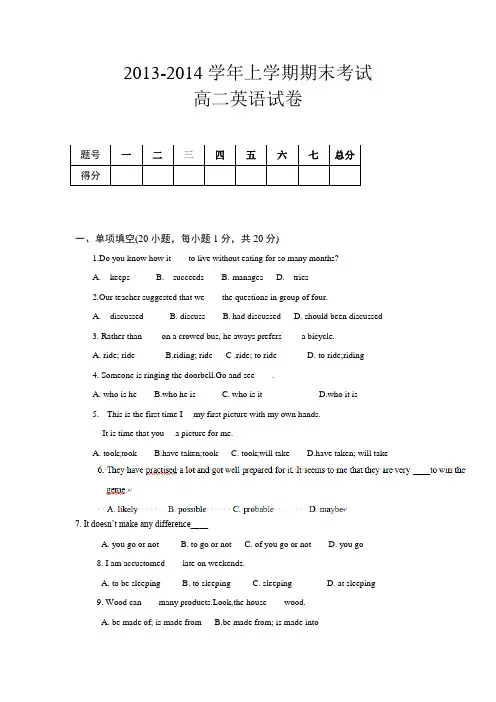
2013-2014学年上学期期末考试高二英语试卷一、单项填空(20小题,每小题1分,共20分)1.Do you know how it____to live without eating for so many months?A. keepsB. succeeds B. manages D. tries2.Our teacher suggested that we____the questions in group of four.A. discussedB. discuss B. had discussed D. should been discussed3. Rather than____ on a crowed bus, he aways prefers____ a bicycle.A. ride; rideB.riding; ride C .ride; to ride D. to ride;riding4. Someone is ringing the doorbell.Go and see____.A. who is heB.who he isC. who is itD.who it is5. --This is the first time I __my first picture with my own hands.--It is time that you__ a picture for me.A. took;tookB.have taken;tookC. took;will takeD.have taken; will take Array7. It doesn’t make any difference____A. you go or notB. to go or notC. of you go or notD. you go8. I am accustomed____late on weekends.A. to be sleepingB. to sleepingC. sleepingD. at sleeping9. Wood can____many products.Look,the house____wood.A. be made of; is made fromB.be made from; is made intoC. be made into; is made ofD. be made up of; is made into10. ____I meet you,I thought of you as my best friend.A. The first timeB.For the first timeC. At firstD. It was the first time11. ---Do you like milk or coffee?---I don’t like______. I usually drink water.A. anotherB. bothC. neitherD. either12. It is high time we ________ home.A. will goB. would goC. have goneD. went13. _____ to do the work, I should do it some other way.A. If were IB. I wereC. Were ID. Was I14. —Mum, I ______ a mistake. Please don’t be angry with me.—It doesn’t matter. I think you’ll do better next time.A. makeB. madeC. will makeD. had made15. The doctor is skilled at treating heart trouble and never accepts any gift from his patients,so he has a very good_____.A. expectationB. reputationC. contributionD. civilization16. Please tell me how the accident_____. I am still in the dark.A. came byB. came outC. came toD. came about17. He is a student at Oxford University, ____for a degree in computer science.A studiedB studyingC to have studiedD to be studying18. ---You must find such long hours very tiring.---_____ I enjoyed it.A. After allB. Never mindC. Not in the leastD. That’s all right19. You shouldn’t ______ your hope. Everything will be better.A. give upB. fix upC. cheer upD. put up20.It was October 1st,1949____new China was founded.A. whichB. thatC. whenD.as二、完形填空(20小题,每小题1分,共20分)During a recent holiday I visited Dusseldorf, a city in the former West Germany. The nine-day trip left a deep impression 21 me. I arrived at Dussedorf airport at 7 pm. It was already 22outside. The first thing I needed to do was to find a place to 23 . I decided to telephone the youth hotel. But to use the phone I needed some 24, I asked a lady for help. To my 25 she gave me three coins to use. But all the phones in the 26 needed phone cards. And phone cards could only be bought at post offices during the 27 . I was 28 I would not be able to call the hotel. An old gentleman helped me. He couldn’t speak English 29 understand that I needed to 30 a phone call. He showed me where the phone was and inserted 31 phone card. I called the youth hotel and found a place to stay that night. The 32 of the German people made me feel that I was not 33 my first day in Germany wasn’t as34 as I expected. Whenever I went, I asked people for 35 . It surprised me that 36 every young German could speak English fluently. Older Germans couldn't speak English very well, but they would try to help me 37 they could. One middle-aged man I asked for directions even 38 me to the place I was looking for. My 39 in Germany totally changed my impression of Germans. Now I think the people couldn't be more40 .29. A. or B. but C. and D. so30. A. make B. have C. do D. answer31. A. another B. a C. my D. his32. A. use B. success C. care D. kindness33. A. really B. nearly out of C. far from D. close to34. A. interesting B. good C. bad D. busy35. A. direction B. distance C. travel D. serve36. A. almost B. even C. only D. already37. A. whenever B. whatever C. wherever D. however38. A. drove B. reached C. moved D. came39. A. experience B. victory C. visit D. memory40. A. friendly B. unfriendly C. cold-hearted D. valuable三、阅读理解(20小题,每小题2分,共40分)AMr. Zhang was a sports fan. He worked in a hospital in the capital. He was busy all the time and had little time to have a rest. And one day he felt unwell and couldn't go on working. He decided to spend a week's holiday in a quiet village where he could go swimming or fishing. He got off at a small railway station and soon got to a quiet village. He took a room hotel and went to sleep as soon as he had a good meal.At first Mr. Zhang enjoyed himself there. He could do everything he wanted and went wherever he liked. Nobody disturbed him and knocked at the door at midnight. But on the fourth day he was in trouble. After lunch it was very hot. He went swimming in the river. Suddenly he saw a beautiful bird in a big tree. He wanted to catch it, so he walked to it, but it found him and flew away ans soon as gone. He began to pick some flowers in the forest and before long he lost his way.The sun had gone down and night had fallen before Mr. Zhang found a small restaurant in another village. He came in and told them to bring him some bread, two eggs and a glass of tea. After a while his food was brought. Soon he ate up all the bread and eggs. When he was going to have the tea, he found there was a fly in the glass.“ What's in my tea?” Mr. Zhang called out, “ A fly”“ It's impossible, sir.” said the owner of the restaurant, “ I had told them to pick all the flies out of your tea before they brought it to you!”41. From the story we can guess Mr. Zhang may be a .A. engineerB. doctorC. tour guideD. translator42. Mr. Zhang decided to take this holiday because .A. he was too tired to go on workingB. he was very busy all the timeC. he was paid a lot of moneyD. he liked swimming and fishing43. Mr. Zhang hoped to spend a week's holiday by ..A. catching birdsB. swimming or fishingC. picking flowersD. having good meals every day44. Mr. Zhang went to the village from home ..A. by busB. by carC. on footD. by train45. Mr. Zhang didn't enjoy himself in the village, did he?A. No, he wasn't.B. Yes, he wasC. No, he didn'tD. Yes, he did.BWorking ageThe legal(合法的)working age in western countries is usually 14 to 16. In the UK and Canada, for example, young people between 14 and 16 can do some light work. Youths over 16 can work full-time. In the US, the legal working age for most jobs is 14. In China, people can do part-time jobs between 16 and 18.Voting ageIn most countries, people can vote at 18, like the US, UK and Canada. It is the same to Chinese people. In many other countries, like Indonesia, the voting age is 17. In Austria, the voting age i s 16. In Singapore, you can’t vote until you’re 21.Driving ageIn the US and Canada, teenagers are allowed to have a driver’s license at 16. In China, Japan and Russia, people are allowed to drive at 18. Drivers as young as 15 can be found in New Zealand and Mexico. Ethiopia(埃塞俄比亚) has the youngest driving age of 14.46. In the UK and Canada, young people _______ can do some light work.A. over 16B. under 16C. from 14 to 16D. between 16 and 1847.People can vote at 18, in _________ .A. US, UK and Austria.B. US, Indonesia and ChinaC. UK, Singapore and ChinaD. US, UK and China48. _______has the youngest driving age .A. New ZealandB. MexicoC. USD. Ethiopia49.In Canada, teenagers _______ can have a driver’s licensc?.A. over 16B. under 16C. from 14 to 16D. between 16 and 1850.What information CANNOT be found in the passage?A. In China, people can do part-time jobs between 16 and 18.B. In Austria, the voting age is 16.C. In the US, the driving age is 15.D. The driving age is 18 in Japan.CThere are fifty states in the United States. The largest in population is California, the largest in area is Alaska. Alaska is the smallest in population and Rhode Island is the smallest in size. The oldest states are the ones along the Atlantic coast. The newest states are Alaska and Hawaii. Alaska is also the coldest state. California and Florida are the warmer. Henry and his family live in Seattle, a big city, on the Pacific coast. But Los Angeles and San Francisco, also on the Pacific coast, are larger than Seattle. Henry's cousin, Susan, lives in New York. It is the largest city in the United States. Thousands of people visit New York each year. The most important city in the United States is Washington, D. C. It is the capital, but it is much smaller than New York.51. How many states are there in the U. S. A. ?A. FiveB. Forty- Five.C. FiftyD. Fifteen.52. Which state is the largest in population?A. California.B. Rhode-Island.C. AlaskaD. Los Angeles .53. Which state is the oldest, the newest, and the smallest in population?A. Rhode Island.B. Seattle.C. San Francisco.D. Alaska.54. Which of the following is true?A. The oldest states are the ones along the Pacific coast.B. Washington is the most important and the largest city.C. New York is the largest city in the United States.D. Henry's cousin lives in the Seattle.55. Why is Washington, D. C. the most important American city? Because _________.A. it is the largest cityB. it is the largest in populationC. it is the most beautiful cityD. it is the capital of the United StatesDJohn sent for a doctor because his wife was ill.He called the doctor and made sure theywould meet at five.He arrived at the doctor's at twenty to five.He thought, "It's a little bit earlier.I'll wait for a moment.It's good to keep the time." Then he stopped his car in front of the doctor's.He looked around and saw a noisy square(广场)not far from here.He went there and sat down on a chair to enjoy the last light of afternoon sun and make himself quiet.He saw some children playing and some women talking to each other happily.Suddenly he heard a girl crying.He came up to her and asked some questions.Then he knew she got lost.John tried to find out her address and took her home.The girl's parents were very thankful.Then John hurried to the doctor's.The doctor said angrily when he saw him, "You're late.Why did you keep me waiting for twenty minutes? " John said nothing but one word—"Sorry56.John drove to the doctor's ______.A.late B.on time C.in time D.in no time57.John went to the square to ______.A.spend the time B.enjoy himself C.see the children and the women D.help the girl58.The girl cried because ______.A.someone hit her B.she fell off her bike C.her parents were angry with her D.she didn't find the way home59.At last John got to the doctor's at ______.A.twenty to five B.twenty past five C.five o'clock D.forty past five 60.From the story, we know John is a ______.A.busy person B.quiet person C.helpful person D.lucky person四、补全对话(每小题2分,共10分)W: Hi, Tom . Where is Jim now? Did you see him?M: Sorry , I’m not sure____61__________.W: Does he really like basketball?M: Yes, _________62_______ You know he is good at playing basketball.W: When did he leave? Do you know?M: _______63______W: Did he tell you when to come back ?M: _____64____what do you want him to do ?W: Mr. Brown wants to see him .He has something important to talk with him __65_______M: Certainly .W: Thank you .Bye .A. About an hour .B. Can you tell him about it when you see himC. No, he didn’t .D. I guess he went to buy the ticket for the basketball match .E. he does .F. Basketball is popular .G. Let me go to see Mr. Brown .五、短文改错(10小题,每小题1分,共10分)66. Do you agree on me? ________________________67. Great changes have been taken place in my hometown in the last few years. _________ ___68. In recently years, many people have been discussing the problem. _______________________69 The doctor gave him some advice about his illness. _______________________70. But not all information are good to society. _______________________71. I would like swimming in the river. ______________ _________72. The reason why I was late for class is because I did't catch the bus. _______________________73. You’d better to hurry up if you want to get home before dark. _______________ ________74. Not I but he have been invited. _______________________75. Whom do you think is the best doctor in town? ______________________六、单词拼写(20小题,每小题1分,共20分)76.数量77.失望的78.预言79.画廊80.交换81.奖学金82.化学家83.不健康的84.信任85.永远86. survival 87.female88.desperate 89.transform 90.typical91.preference 92.give up 93.take it easy94.take risks 95.run out of七、写作(30分)根据下列提示,请你写一篇日记,记述五月一日(星期五)你和李明一起去参观科技博物馆的事。
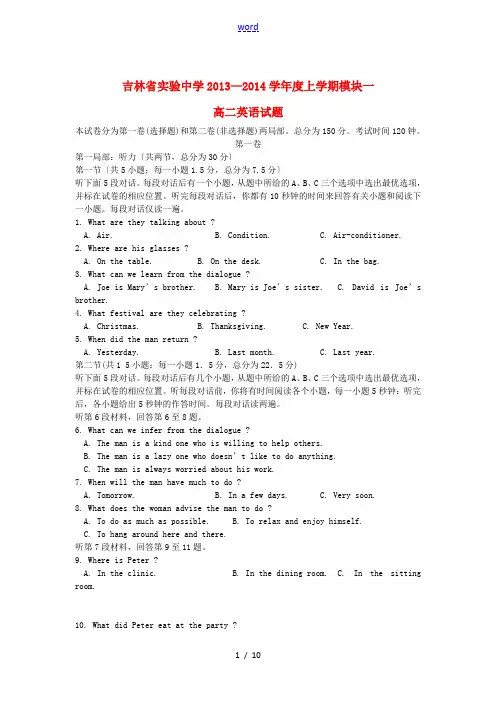
吉林省实验中学2013—2014学年度上学期模块一高二英语试题本试卷分为第一卷(选择题)和第二卷(非选择题)两局部。
总分为150分。
考试时间120钟。
第一卷第一局部:听力〔共两节,总分为30分〕第一节〔共5小题;每一小题1.5分,总分为7.5分〕听下面5段对话。
每段对话后有一个小题,从题中所给的A、B、C三个选项中选出最优选项,并标在试卷的相应位置。
听完每段对话后,你都有10秒钟的时间来回答有关小题和阅读下一小题。
每段对话仅读一遍。
1. What are they talking about ?A. Air.B. Condition.C. Air-conditioner.2. Where are his glasses ?A. On the table.B. On the desk.C. In the bag.3. What can we learn from the dialogue ?A. Joe is Mary’s brother.B. Mary is Joe’s sister.C. David is Joe’s brother.4. What festival are they celebrating ?A. Christmas.B. Thanksgiving.C. New Year.5. When did the man return ?A. Yesterday.B. Last month.C. Last year.第二节(共1 5小题:每一小题1.5分,总分为22.5分)听下面5段对话。
每段对话后有几个小题,从题中所给的A、B、C三个选项中选出最优选项,并标在试卷的相应位置。
听每段对话前,你将有时间阅读各个小题,每一小题5秒钟:听完后,各小题给出5秒钟的作答时间。
每段对话读两遍。
听第6段材料,回答第6至8题。
6. What can we infer from the dialogue ?A. The man is a kind one who is willing to help others.B. The man is a lazy one who doesn’t like to do anything.C. The man is always worried about his work.7. When will the man have much to do ?A. Tomorrow.B. In a few days.C. Very soon.8. What does the woman advise the man to do ?A. To do as much as possible.B. To relax and enjoy himself.C. To hang around here and there.听第7段材料,回答第9至11题。
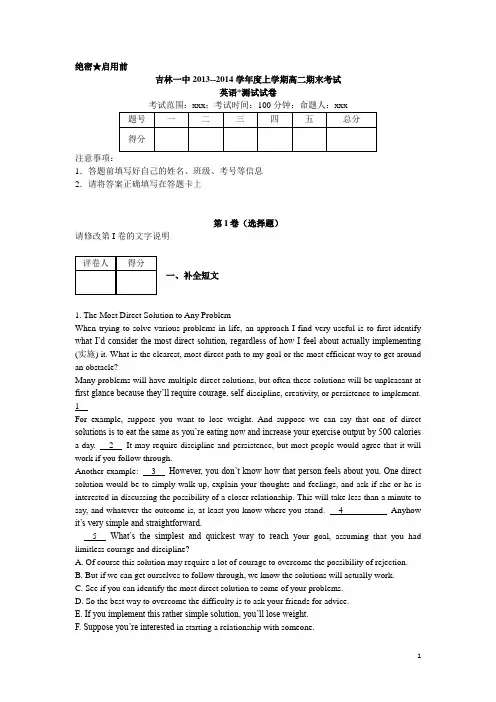
绝密★启用前吉林一中2013--2014学年度上学期高二期末考试英语*测试试卷考试范围:xxx;考试时间:100分钟;命题人:xxx1.答题前填写好自己的姓名、班级、考号等信息2.请将答案正确填写在答题卡上第I卷(选择题)请修改第I卷的文字说明一、补全短文1. The Most Direct Solution to Any ProblemWhen trying to solve various problems in life, an approach I find very useful is to first identify what I’d consider the most direct solution, regardless of how I feel about actually implementing (实施) it. What is the clearest, most direct path to my goal or the most efficient way to get around an obstacle?Many problems will have multiple direct solutions, but often these solutions will be unpleasant at first glance because they’ll require courage, self-discipline, creativity, or persistence to implement. 1For example, suppose you want to lose weight. And suppose we can say that one of direct solutions is to eat the same as you’re eating now and increase your exercise output by 500 calories a day. 2 It may require discipline and persistence, but most people would agree that it will work if you follow through.Another example: 3 However, you don’t know how that person feels about you. One direct solution would be to simply walk up, explain your thoughts and feelings, and ask if she or he is interested in discussing the possibility of a closer relationship. This will take less than a minute to say, and whatever the outcome is, at least you know where you stand. 4 Anyhow it’s very simple and straightforward.5 What’s the simplest and quickest way to reach y our goal, assuming that you had limitless courage and discipline?A. Of course this solution may require a lot of courage to overcome the possibility of rejection.B. But if we can get ourselves to follow through, we know the solutions will actually work.C. See if you can identify the most direct solution to some of your problems.D. So the best way to overcome the difficulty is to ask your friends for advice.E. If you implement this rather simple solution, you’ll lose weight.F. Suppose you’re interested in starting a relationship with someone.G. However, the solution implemented does not work.2. 根据短文内容,从短文后的选项中选出能填入空白处的最佳选项(选项中有两项为多余选项).并在答案卡上将该项涂黑。
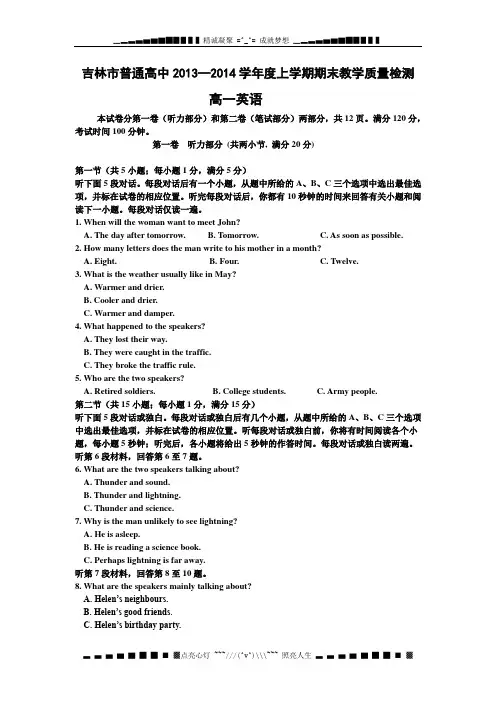
吉林市普通高中2013—2014学年度上学期期末教学质量检测高一英语本试卷分第一卷(听力部分)和第二卷(笔试部分)两部分,共12页。
满分120分,考试时间100分钟。
第一卷听力部分(共两小节, 满分20分)第一节(共5小题;每小题1分,满分5分)听下面5段对话。
每段对话后有一个小题,从题中所给的A、B、C三个选项中选出最佳选项,并标在试卷的相应位置。
听完每段对话后,你都有10秒钟的时间来回答有关小题和阅读下一小题。
每段对话仅读一遍。
1. When will the woman want to meet John?A. The day after tomorrow.B. Tomorrow.C. As soon as possible.2. How many letters does the man write to his mother in a month?A. Eight.B. Four.C. Twelve.3. What is the weather usually like in May?A. Warmer and drier.B. Cooler and drier.C. Warmer and damper.4. What happened to the speakers?A. They lost their way.B. They were caught in the traffic.C. They broke the traffic rule.5. Who are the two speakers?A. Retired soldiers.B. College students.C. Army people.第二节(共15小题;每小题1分,满分15分)听下面5段对话或独白。
每段对话或独白后有几个小题,从题中所给的A、B、C三个选项中选出最佳选项,并标在试卷的相应位置。
听每段对话或独白前,你将有时间阅读各个小题,每小题5秒钟;听完后,各小题将给出5秒钟的作答时间。
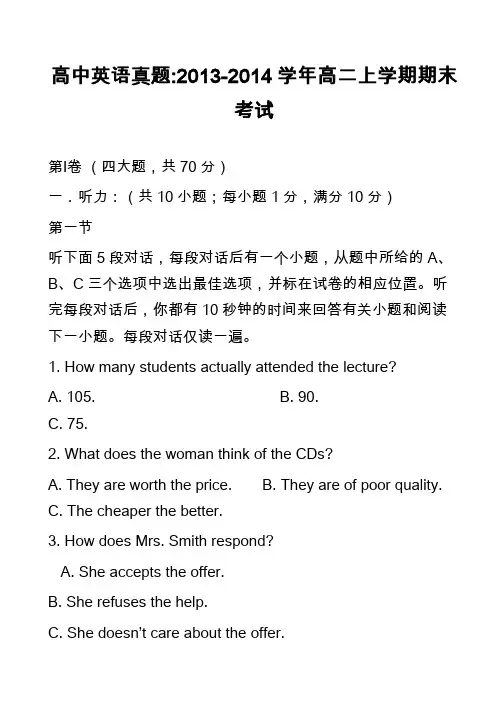
高中英语真题:2013-2014学年高二上学期期末考试第Ⅰ卷(四大题,共70分)一.听力:(共10小题;每小题1分,满分10分)第一节听下面5段对话,每段对话后有一个小题,从题中所给的A、B、C三个选项中选出最佳选项,并标在试卷的相应位置。
听完每段对话后,你都有10秒钟的时间来回答有关小题和阅读下一小题。
每段对话仅读一遍。
1. How many students actually attended the lecture?A. 105.B. 90.C. 75.2. What does the woman think of the CDs?A. They are worth the price.B. They are of poor quality.C. The cheaper the better.3. How does Mrs. Smith respond?A. She accepts the offer.B. She refuses the help.C. She doesn’t care about the offer.4. What happened to the woman?A. She had some money stolen.B. She was robbed.C. She couldn’t get in.5. What will the woman do?A. Cook for the man.B. Treat the man a lunch.C. Deal with the man.第二节听下面5段对话或独白。
每段对话或独白后有几个小题,从题中所给的A、B、C三个选项中选出最佳选项,并标在试卷的相应位置。
听完每段对话或独白前,你将有5秒钟的时间阅读各个小题;听完后,各小题将给出5秒钟的作答时间。
每段对话或独白读两遍。
听下面一段材料,回答第6至8题6. What can we know about “Bed & Breakfast”?A. It’s the cheapest place to live.B. People can get information about it through the map.C. It always shows signs in the window.7. What are the youth hostels like?A. They only offer a bed.B. They are very big.C. They look nice and clean.8. What is the woman probably?A. A tourist.B. A tour guide.C. A reporter.听下面一段对话,回答第9至10题。
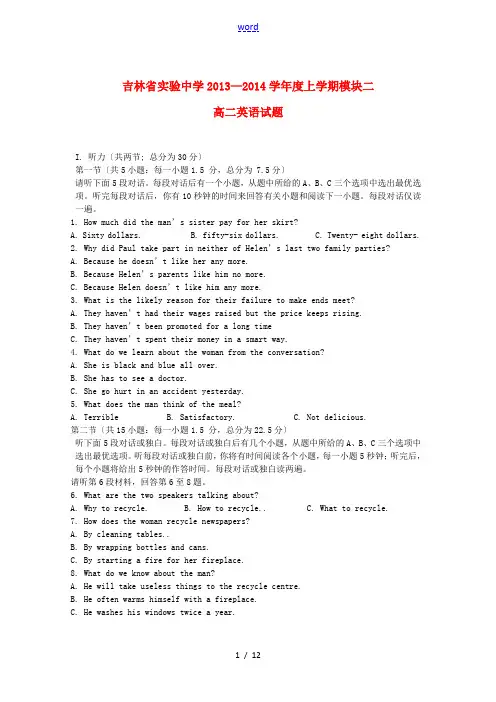
吉林省实验中学2013—2014学年度上学期模块二高二英语试题I. 听力〔共两节; 总分为30分〕第一节〔共5小题:每一小题1.5 分,总分为 7.5分〕请听下面5段对话。
每段对话后有一个小题,从题中所给的A、B、C三个选项中选出最优选项。
听完每段对话后,你有10秒钟的时间来回答有关小题和阅读下一小题。
每段对话仅读一遍。
1. How much did the man’s sister pay for her skirt?A. Sixty dollars.B. fifty-six dollars.C. Twenty- eight dollars.2. Why did Paul take part in neither of Helen’s last two family parties?A. Because he doesn’t like her any more.B. Because Helen’s parents like him no more.C. Because He len doesn’t like him any more.3. What is the likely reason for their failure to make ends meet?A. They haven’t had their wages raised but the price keeps rising.B. They haven’t been promoted for a long timeC. They hav en’t spent their money in a smart way.4. What do we learn about the woman from the conversation?A. She is black and blue all over.B. She has to see a doctor.C. She go hurt in an accident yesterday.5. What does the man think of the meal?A. TerribleB. Satisfactory.C. Not delicious.第二节〔共15小题:每一小题1.5 分,总分为22.5分〕听下面5段对话或独白。
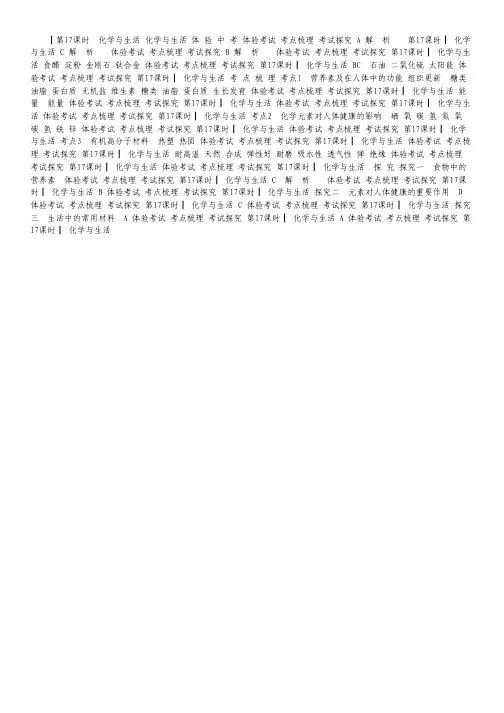
┃第17课时 化学与生活 化学与生活 体 验 中 考 体验考试 考点梳理 考试探究 A 解 析 第17课时┃ 化学与生活 C 解 析 体验考试 考点梳理 考试探究 B 解 析 体验考试 考点梳理 考试探究 第17课时┃ 化学与生活 食醋 淀粉 金刚石 钛合金 体验考试 考点梳理 考试探究 第17课时┃ 化学与生活 BC 石油 二氧化硫 太阳能 体验考试 考点梳理 考试探究 第17课时┃ 化学与生活 考 点 梳 理 考点1 营养素及在人体中的功能 组织更新 糖类油脂 蛋白质 无机盐 维生素 糖类 油脂 蛋白质 生长发育 体验考试 考点梳理 考试探究 第17课时┃ 化学与生活 能量 能量 体验考试 考点梳理 考试探究 第17课时┃ 化学与生活 体验考试 考点梳理 考试探究 第17课时┃ 化学与生活 体验考试 考点梳理 考试探究 第17课时┃ 化学与生活 考点2 化学元素对人体健康的影响 硒 氧 碳 氢 氮 氧碳 氢 铁 锌 体验考试 考点梳理 考试探究 第17课时┃ 化学与生活 体验考试 考点梳理 考试探究 第17课时┃ 化学与生活 考点3 有机高分子材料 热塑 热固 体验考试 考点梳理 考试探究 第17课时┃ 化学与生活 体验考试 考点梳理 考试探究 第17课时┃ 化学与生活 耐高温 天然 合成 弹性好 耐磨 吸水性 透气性 弹 绝缘 体验考试 考点梳理考试探究 第17课时┃ 化学与生活 体验考试 考点梳理 考试探究 第17课时┃ 化学与生活 探 究 探究一 食物中的营养素 体验考试 考点梳理 考试探究 第17课时┃ 化学与生活 C 解 析 体验考试 考点梳理 考试探究 第17课时┃ 化学与生活 B 体验考试 考点梳理 考试探究 第17课时┃ 化学与生活 探究二 元素对人体健康的重要作用 D 体验考试 考点梳理 考试探究 第17课时┃ 化学与生活 C 体验考试 考点梳理 考试探究 第17课时┃ 化学与生活 探究三 生活中的常用材料 A 体验考试 考点梳理 考试探究 第17课时┃ 化学与生活 A 体验考试 考点梳理 考试探究 第17课时┃ 化学与生活。
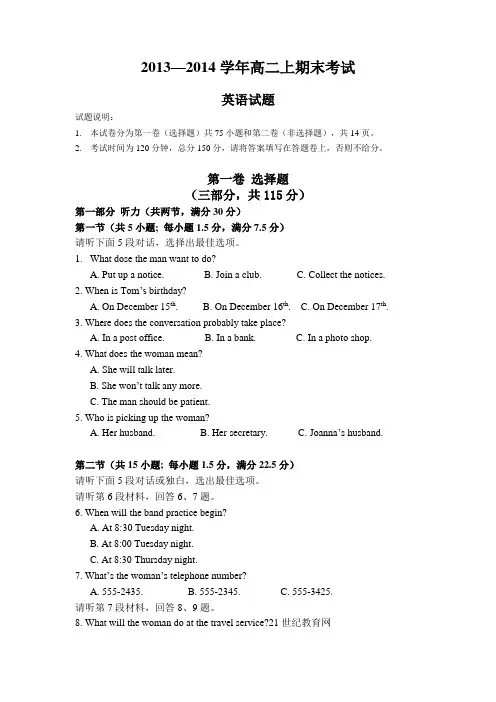
2013—2014学年高二上期末考试英语试题试题说明:1.本试卷分为第一卷(选择题)共75小题和第二卷(非选择题),共14页。
2.考试时间为120分钟,总分150分,请将答案填写在答题卷上,否则不给分。
第一卷选择题(三部分,共115分)第一部分听力(共两节,满分30分)第一节(共5小题; 每小题1.5分,满分7.5分)请听下面5段对话,选择出最佳选项。
1.What dose the man want to do?A. Put up a notice.B. Join a club.C. Collect the notices.2. When is Tom’s birthday?A. On December 15th.B. On December 16th.C. On December 17th.3. Where does the conversation probably take place?A. In a post office.B. In a bank.C. In a photo shop.4. What does the woman mean?A. She will talk later.B. She won’t talk any more.C. The man should be patient.5. Who is picking up the woman?A. Her husband.B. Her secretary.C. Joanna’s husband.第二节(共15小题; 每小题1.5分,满分22.5分)请听下面5段对话或独白,选出最佳选项。
请听第6段材料,回答6、7题。
6. When will the band practice begin?A. At 8:30 Tuesday night.B. At 8:00 Tuesday night.C. At 8:30 Thursday night.7. What’s the woman’s telephone number?A. 555-2435.B. 555-2345.C. 555-3425.请听第7段材料,回答8、9题。
![[精品]吉林省吉林市2012-2013学年高二英语上学期期末考试试卷新人教版及答案](https://uimg.taocdn.com/24977bf480eb6294dd886ca9.webp)
吉林省实验中学2012—2013学年度上学期期末考试高二英语试题本试卷分第I卷(选择题)和第II卷(非选择题)两部分,共150分,考试时间120分钟.命题人:高二备课组审题人:高二备课组第I卷第一部分:听力(共两节,满分30分)第一节(共5小题;每小题1.5分,满分7.5分)听下面5段对话。
每段对话后有一个小题,从题中所给的A、B、C三个选项中选出最佳选项,并标在试卷的相应位置。
听完每段对话后,你都有10秒钟的时间来回答有关小题和阅读下一小题。
每段对话仅读一遍。
1. How does the man get to work every day?A. By car.B. By bus.C. On foot.2. Where is Peter probably?A. At home.B. In a library.C. In his office.3. What will the woman tell Mr. Miller to do?A. Wait a minute.B. Ring off.C. Ringback later.4. What do we know about the man?A. He has read a lot about cooking.B. He is skilled at cooking.C. He once went to Italy on business.5. What are the speakers mainly talking about?A. Their vacation plans.B. Some famous places.C. Their parents abroad.第二节(共15小题;每小题1.5分,满分22.5分)听下面5段对话或独白。
每段对话或独白后有几个小题,从题中所给的A、B、C三个选项中选出最佳选项,并标在试卷的相应位置。
听每段对话或独白前,你将有时间阅读各个小题,每小题5秒钟;听完后,各小题将给出5秒钟的作答时间。
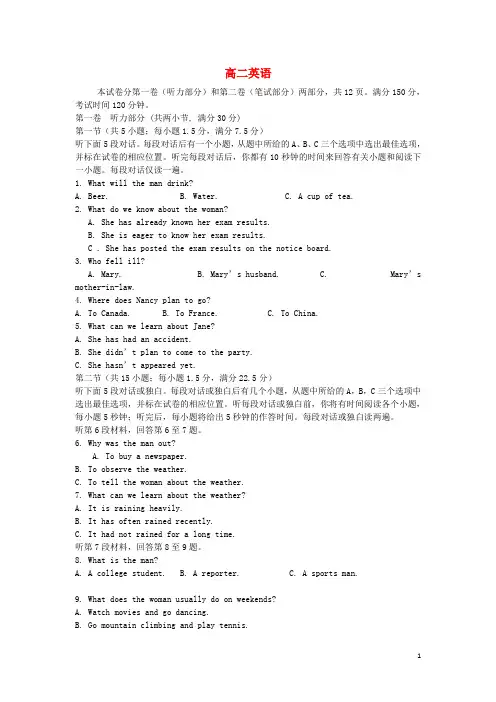
高二英语本试卷分第一卷(听力部分)和第二卷(笔试部分)两部分,共12页。
满分150分,考试时间120分钟。
第一卷听力部分 (共两小节, 满分30分)第一节(共5小题;每小题1.5分,满分7.5分)听下面5段对话。
每段对话后有一个小题,从题中所给的A、B、C三个选项中选出最佳选项,并标在试卷的相应位置。
听完每段对话后,你都有10秒钟的时间来回答有关小题和阅读下一小题。
每段对话仅读一遍。
1. What will the man drink?A. Beer.B. Water.C. A cup of tea.2. What do we know about the woman?A. She has already known her exam results.B. She is eager to know her exam results.C . She has posted the exam results on the notice board.3. Who fell ill?A. Mary.B. Mary’s husband.C. Mary’s mother-in-law.4. Where does Nancy plan to go?A. To Canada.B. To France.C. To China.5. What can we learn about Jane?A. She has had an accident.B. She didn’t plan to come to the party.C. She hasn’t appeared yet.第二节(共15小题;每小题1.5分,满分22.5分)听下面5段对话或独白。
每段对话或独白后有几个小题,从题中所给的A,B,C三个选项中选出最佳选项,并标在试卷的相应位置。
听每段对话或独白前,你将有时间阅读各个小题,每小题5秒钟;听完后,每小题将给出5秒钟的作答时间。
吉林市普通中学2009—2010学年度高中毕业班上学期期末教学质量检测英语本试卷分第一卷(选择题)和第二卷(非选择题)两部分。
第一卷1至10页,第二卷11至12页。
共150分。
考试时间120分钟。
注意事项:请按照题号顺序在答题纸上各题目的答题区域内作答,超出答题区域书写的答案无效;在草稿纸、试题卷上答题无效。
第一卷 (共三部分,115分)第一部分听力(共两节,满分30分)第一节 (共5小题;每小题1.5分,满分7.5分)听下面5段对话。
每段对话后有一个小题,从题中所给的A、B、C三个选项中选出最佳选项,并标在试卷的相应位置,听完每段对话后,你都有10秒钟的时间回答有关小题和阅读下一小题。
每段对话仅读一遍。
1. How many students are good at basketball?A. About 10.B. About 4.C. About 40.2. What does the man’s answer mean?A. He doesn’t know about the park.B. The park is too far away.C. There is no park here.3. Who is Dam Morrison?A. Tom’s boss.B. Tom’s doctor.C. Mary’s doctor.4. How can the man get to the post office?A. Go eastward and turn right.B. Go eastward and turn left.C. Go westward and turn left.5. What can we know from the conversation?A. The woman asks the man for a lift.B. The woman won’t take the man’s car to the bank.C. The bank and the man’s office are in the same direction.第二节 (共15小题;每小题1.5分,满分22.5分)听下面5段对话。
吉林省实验中学上学期期末考试高二英语试题本试卷分第I卷(选择题)和第II卷(非选择题)两部分,共150分,考试时间120分钟.命题人:高二备课组审题人:高二备课组第I卷第一部分:听力(共两节,满分30分)第一节(共5小题;每小题1.5分,满分7.5分)听下面5段对话。
每段对话后有一个小题,从题中所给的A、B、C三个选项中选出最佳选项,并标在试卷的相应位置。
听完每段对话后,你都有10秒钟的时间来回答有关小题和阅读下一小题。
每段对话仅读一遍。
1. How does the man get to work every day?A. By car.B. By bus.C. On foot.2. Where is Peter probably?A. At home.B. In a library.C. In his office.3. What will the woman tell Mr. Miller to do?A. Wait a minute.B. Ring off.C. Ring back later.4. What do we know about the man?A. He has read a lot about cooking.B. He is skilled at cooking.C. He once went to Italy on business.5. What are the speakers mainly talking about?A. Their vacation plans.B. Some famous places.C. Their parents abroad.第二节(共15小题;每小题1.5分,满分22.5分)听下面5段对话或独白。
每段对话或独白后有几个小题,从题中所给的A、B、C三个选项中选出最佳选项,并标在试卷的相应位置。
听每段对话或独白前,你将有时间阅读各个小题,每小题5秒钟;听完后,各小题将给出5秒钟的作答时间。
2013-2014学年高二上学期期末考试英语试题第一部分:听力(共两节,满分30分)做题时,先将答案划在试卷上。
录音内容结束后,你将有两分钟的时间将试卷上的答案转涂到答题卡上。
第一节(共5小题;每小题1. 5分,满分'5分)听下面5段对话。
每段对话后有一个小题,从题中所给的A、B、C三个选项中选出最佳选项,并标在试卷的相应位置。
听完每段对话后,你都有10秒钟的时间来回答有关小题和阅读下一小题。
每段对话仅读一遍。
例:How much is the shirt?A. 9. 15.B. 9. 15.C. 9. 18.答案:B1. Where does the conversation take place?A. In a hotel.B. In a restaurant.C. In a theatre2. What did the man do this morning?A. Walked the dog.B. Did the laundry.C. Watered the plants.3. How long does the woman plan to study in England?A. Over 3 months.B. About 1 month.C. Over 4 months.4. What is the woman studying this year?A. Yoga.B. Cooking.C. Dancing.5. What has happened to the man?A. He had a car accident.B. He was struck by something.C. He stepped on some chewing gum.第二节(共15小题;每小题1. 5分,满分22. 5分)听下面5段对话或独白。
每段对话或独白后有几个小题,从题中所给的A、B、C三个选项中选出最佳选项,并标在试卷的相应位置。
2013-2014学年高二上学期期末考试英语试题一完形填空(本大题有15小题,每小题2分,共30分)"Everything happens for the best, "my mother said whenever I faced disappointment, "If you 1 on, something good will happen some day." Mother was right, as I discovered after graduating from college. I had 2 myself for a sports announcer. So I went to Chicago to knock on the door of every station and was 3 every time. In one station, a kind lady told me that 4 stations wouldn't employ a person without 5 since I had just graduated. "Go out in the town and find a small station that might give you a chance, "she said.I returned to Dixon, where I had finished my high school education and had 6 in the school football team. My father said that our town had built a store and wanted a man to manage its sports department. The job sounded just 7 for me but I wasn't hired.My disappointment had 8 as if by design. "Everything happens for the best," Mum 9 me. Dad lent me his car to look for a job. I tried WOC Radio Davenport. The program director told me they had already hired an announcer. 10 I left his office,! asked aloud," 11 can a fellow get to be a sports announcer if he can't get a job in a radio station?" Suddenly, I heard the director 12 . "Do you know anything about football? " Then he asked me to 13 an imaginary game. It was easy, and I did it without difficulty. The director was 14 and told me I would be broadcasting a game on the 15 Saturday.1 A put B take C move D carry2 A devoted B designed C found D enjoyed3 A invited B promised C refused D accepted4 A large B all C no D small5 A experience B examination C agreement D college6 A played B joined C taken D fought7 A possible B successful C right D important8 A shown B disappeared C resulted D turned9 A woke B advised C demanded D reminded10 A While B After C Before D So11 A What B How C Whenever D Wherever12 A calling B answering C broadcasting D announcing13 A make B act C broadcast D play14 A moved B sorry C thankful D satisfied15 A future B coming C last D later二根据课文内容用适当的词填空,使短文完整(一空一词)。
2013--2014学年度上学期期末考试高二英语试题(有答案)(时间100分钟总分:120分)第一卷选择题(共69分)I. 单项填空(共15 小题,每小题1 分,满分15 分)1. _______you see near the North Pole is nothing but ice and snow.A.That B.What C.Which D.Who2. It is a beautiful cell phone but it is not the price that I paid for it.A.reasonable B.valuable C.fit D.worth3.Yesterday we visited the houses during the war years.A.built B.being built C.had been built D. to be built 4._______ you dare to overcome difficulties with your studies,______make great progress in the future.A.Only if, can you B.If, can youC.Only if, you can D. If, you can to5.You ___________ the chairman yesterday but you didn’t come.A. sawB. had seenC. could have seenD. could see6. _______ more about university courses, call (920) 746-3789.A.To find out B.Finding out C.Find out D.Having found out 7. -- Where to, Jane?-- I'm going to have my notebook ________?A.to be repaired B.repaired C.being repaired D.to repair 8. ______ no doubt ______he can win the game this time.A.There’s; that B.There’s; whetherC.It’s; that D.It’s; whether9. To our delight, she quickly adjusted herself ______ the situation.A.with B.of C.to D.into10. We should build our country into a socialist one that is characteristic_______China.A. withB. ofC. toD.for11. After a careful investigation,we drew a conclusion______ theirdecision was wrong.A. whichB. 不填C. whetherD. that12.We’ve made up our minds to be a credit ___ our school in the contest.A. forB. withC. toD. into13.We _______ her to stop doing the experiment in no time,but her lookon her face suggested that she _______ to do so.A. suggested, refusedB. advised, refuseC. suggested, refuseD. advised, refused14.______ of her dog, the kid didn’t dare to go to her house.A. Being frightenedB. FrightenedC. FrighteningD. To be frightened15.I shall never forget the day Shenzhou VI was launched,has a great effect on my life.A.when , which B.that , whichC.which ,that D.when,thatII. 完形填空(共20小题,满分30 分)I Passed My Drive Test!I’d been 16 for six days and was already prepared to deal with failure.I remember that, when my mum 16 me that morning, her voice wasn’t as screaming as it usually was. She had been 17 for more than one hour getting everything ready, and I could feel she was18 me at the same time.I stayed in bed for a few minutes. I was 19 to leave its warmth and 20 to face the suffering that I’d rather let myself forget for the past months. Finally, I dragged myself 21 .The first thing I thought of after getting up was to 22 . I went to the kitchen and prepared a breakfast that was fairly 23 , but was still too big for my appetite(食欲,胃口) that day. I kept telling myself that I 24 eat. Breakfast is the most important meal of the day, and this wasn’t a(n) 25 day. Besides maybe it would 26 me a little. But I doubted it. I left the kitchen because even the 27 made me feel sick.I finished getting ready and tried to settle down. It didn’t 28 , so I decided that my mum and I should go. We had 29 time, so I thought we could practise parking. I 30 , with the wheel hitting the pavement(人行道). After that, the little bit of confidence I had was31 . I tried two more times, but did not improve much. Then we went towards the driving 32 site (地点).I waited twenty minutes---just enough time to make myself believe that I was going to fail. Then, finally, it was my 33 . I wasn’t sure of myself at all. I just wanted to get it over and make sure that I had to come back next Thursday.The first thing I had to do was parking, which I did quite well. The 34 that came with it hit me like a wave. The rest of the test went well and I passed it.The 35 of my mum made her face softer. I knew her worry was gone and she was happy for me.16. A. cried B. woke C. told D. shouted17. A. up B. over C. out D. in18. A. smiling at B. worrying about C. looking at D. talking with19. A. sad B. eager C. unwilling D. willing20. A. convenience B. friendship C. quiet D. comfort21. A. out of bed B. onto bed C. into bed D. in bed22. A. eat B. rest C. drink D. work23. A. large B. small C. delicious D. good24. A. might B. could C. should D. hated25. A. important B. necessary C. lucky D. ordinary26. A. calm B. hurt C. stop D. like27. A. milk B. bread C. smoke D. smells28. A. work B. do C. calm D. use29. A. little B. plenty of C. no D. a little30. A. cried B. succeeded C. failed D. left31. A. back B. gone C. there D. greater32. A. start B. office C. race D. test33. A. try B. turn C. car D. chance34. A. happiness B. pride C. confidence D.disappointment35. A. tears B. lines C. smiles D. eyesIII.阅读理解(满分24分)AA man in a very splendid restaurant started to take off his jacket. Seeing this, the head waiter dashed to his table and said, “I’m afrai d I must ask you to keep your jacket on, sir, for it is not good manners to do it in such a smart restaurant.”“Now listen”, said the man, “I’ll let you know that the Queen of England gave me permission to remove my jacket here.”“The Queen of England?” sa id the waiter in great surprise.“Sure,” replied the man, “When I was in England last month, a friend of mine who had a very important position in high society took me to see the Queen. It was rather hot, so I started taking my coat off. The Queen looked over and said, “You may do that in the United States, but you may not do it here.” So I got the Queen’s permission, right?”36. It is certain that the story happened _______.A. in EnglandB. in the Queen’s partyC. in AmericaD. in an ordinary restaurant37. When the head waiter asked the man not to take off his jacket, the man .A. took his advice immediatelyB. obeyed him without any hesitationC. apologized for his bad mannersD. refused to listen to him38. The man thought he could take off his jacket because _______.A. he was permitted by the Queen of England to do so in the U. S.B. the weather was so hot that no one could stand itC. he had the freedom of taking off his clothes anywhereD. he was in such a shabby restaurant39. What the Queen really meant was that _______.A. people in the U. S. were less politeB. he shouldn’t take off his coat in such a formal occasion in EnglandC. she permitted him to take off his jacket in AmericaD. the English and the Americans enjoyed different ways of life40. From the story, you can see the man was _______.A. one who didn’t have good understandingB. such a man as used to make troubleC. always ready to do what the Queen told him toD. humorous and carelessBMost dog owners feel that their dogs are their best friends. Almost everyone likes dogs because they try hard to please their owners. One of my favorite stories is about a dog who wanted his owner to please him.One of my friends has a large German shepherd ( 牧羊狗) named Jack. Every Sunday afternoon, my friend takes Jack for a walk in the park. Jack likes these long walks very much.One Sunday afternoon, a young man came to visit my friend. Hestayed a long time, and he talked and talked. Soon it was time for my friend to take Jack for his walk, but the visitor didn’t leave. Jack became very worried about his walk in the park. He walked around the room several times and then sat down directly in front of the visitor and looked at him. But the visitor paid no attention. He continued talking. Finally, Jack couldn’t stand it any longer. He went out of the room and came back a few minutes later. He sat down again in front of the visitor, but this time he held the man’s hat in his mouth.German shepherds aren’t the only intelligent dogs. Another intelligent dog is a Seeing Eye dog. This is a special dog which helps blind people walk along the streets and do many other things. We call these dogs Seeing Eye dogs becaus e they are the “eye” of the blind people and they help them to “see”. Seeing Eye dogs generally go to special schools for several years to learn to help blind people.41. The writer tells the story about the dog Jack to show that____.A. it, like many other dogs, always tried to please its owner masterB. it, unlike many other dogs, always wanted its master to please itC. it was more intelligent than many other dogsD. it was the most faithful dog of his friend’s42. Jack came to sit in front of the visitor in order to____.A. please himB. be pleasedC. ask him to leave immediatelyD. invite him for a walk43. The sentence “Finally, Jack couldn’t stand it any longer.” means___.A. Jack could no longer put up with the visitorB. Jack could no longer stand but he might sit downC. Jack was very tired and wanted a restD. Jack was very angry with the visitor44. Which of the following titles would be the best for the passage?A. Dogs ─ A Great Help to PeopleB. Dogs ─ O ur Faithful CompanionsC. An Introduction to DogsD. Famous Dogs in GermanyCIn Jane Austin’s time, unmarried girls were always closely guarded, and hardly allowed to be alone with a young man; and during the Victorian period (just the period after Jane Austin) exposure(暴露) of the body in particular was thought to be most immoral, Victorian ladies wore dresses reaching down to their feet, long in the sleeve and high at the neck. Since then, ways of dressing as well as times have changed. Girls were no longer guarded, and they can do more or less what they like. And yet among all these astonishing changes, one thing has remained much the same for most people, and that is the same of becoming a mother before being married. If this does happen, there often comes a quick marriage with the responsible man. If this is impossible, the affair maybring considerable shame to the girl’s parents as well as to herself.It is now quite normal for a girl, once past the age of about fifteen, to go out with a boyfriend, and although her parents will probably insist that she come home at a certain time, beyond this they depend on her or look after herself. Kisses between young men and women are now considered to be perfectly normal, but although times have changed so much, most people still believe that a woman should not become a mother before being married.45. In Jane Austin periods, a girl______________ before her marriage.A. always faced all kinds of dangers.B. was not permitted to get in touch with men.C. was always carefully kept staying morally pureD. usually felt lonely.46. From the article, we learn that ________________.A. an unmarried girl must come back home for the night.B. it is good for a girl of 15 to have a boyfriend.C. the unmarried girl who has a baby needn’t get married at once.D. a girl of 15 has the right to be alone with her boyfriend.47. The main idea of this article is that _________.A. a girl should not become a mother before being married.B. girls are no longer closely guarded.C. ways of dressing have changed with the time.D. exposure of the body has been thought to be immoral第二卷(共51分)IV. 短文改错(共10小题,每小题1分,满分10分)Today we were organized for a short trip to the West Hill.We set out by the school bus at 7:30 a.m. The weather 48. _______ was pleasant and every one of us were excited. After 49. ________ two hour’s ride, we arrived there at nine thirty. We50. _________ began our programs as soon as we got off from the bus. 51. ________ We played games on the hillside and swimming in the river. 52._______ After that we had our picnic lunch. In afternoon 53. ________ we walked along the river, that winds around the hills. 54. ________ We took a lot of photo and enjoyed ourselves very 55. ______ much. Time past quickly and we had to come back. 56. _______ It was over five o’clock when we returned school.57. _______ What a good trip we had today! I’ll never forget it.V. 单词拼写(每个1分,共6分)58. The doctor ______________(断定) that his disease was only a cold.59. He was _____________(被击败) at chess last night.60. He is very __________________(热心)about his work.61. Many years of ______不断的)conflicts made the people suffer a lot.62. We found the medical team _____________(组成) of ten people.63. It is a great _____________(方便)to have the doctor living near us. VI书面表达(满分25分)假设你是李明,暑假期间在美国参加夏令营活动,现已回国。
2013-2014学年度吉林省吉林市普通中学高中毕业班摸底测试英语第I卷听力部分第一部分听力(共两节,满分30分)第一节(共5小题;每小题1.5分,满分7.5分)听下面5段对话。
每段对话后有一个小题,从题中所给的A、B、C三个选项中选出最佳选项,并标在试卷的相应位置,听完每段对话后,你都有10秒钟的时间回答有关小题和阅读下一小题。
每段对话仅读一遍。
1. What did the girl do yesterday afternoon?A. She met her friends.B. She went to the library.C. She flew kites.2. What is the man doing?A. Doing some shopping.B. Translating words.C. Using a machine.3. Where does the conversation probably take place?A. In a hotel.B. In a library.C. In a classroom.4. What's the relationship between the speakers?A. Teacher and student.B. Doctor and patient.C. Boss and employee.5. What is the woman probably going to do this weekend?A. Rent a boat in the Water Park.B. Go out with her parents.C. Prepare for a competition.第二节(共15小题;每小题1.5分,共22.5分)听下面5段对话或独白,每段对话或独白后有几道小题,从每题所给的A、B、C三个选项中选出最佳选项。
听每段对话或独白前,你将有5秒钟的时间阅读每小题。
吉林市普通高中2013—2014学年度上学期期末教学质量检测高二英语本试卷分第一卷(听力部分)和第二卷(笔试部分)两部分,共12页。
满分150分,考试时间120分钟。
第一卷听力部分 (共两小节, 满分30分)第一节(共5小题;每小题1.5分,满分7.5分)听下面5段对话。
每段对话后有一个小题,从题中所给的A、B、C三个选项中选出最佳选项,并标在试卷的相应位置。
听完每段对话后,你都有10秒钟的时间来回答有关小题和阅读下一小题。
每段对话仅读一遍。
1. What will the man drink?A. Beer.B. Water.C. A cup of tea.2. What do we know about the woman?A. She has already known her exam results.B. She is eager to know her exam results.C . She has posted the exam results on the notice board.3. Who fell ill?A. Mary.B. Mary’s husband.C. Mary’s mother-in-law.4. Where does Nancy plan to go?A. To Canada.B. To France.C. To China.5. What can we learn about Jane?A. She has had an accident.B. She didn’t plan to come to the party.C. She hasn’t appeared yet.第二节(共15小题;每小题1.5分,满分22.5分)听下面5段对话或独白。
每段对话或独白后有几个小题,从题中所给的A,B,C三个选项中选出最佳选项,并标在试卷的相应位置。
听每段对话或独白前,你将有时间阅读各个小题,每小题5秒钟;听完后,每小题将给出5秒钟的作答时间。
每段对话或独白读两遍。
听第6段材料,回答第6至7题。
6. Why was the man out?A. To buy a newspaper.B. To observe the weather.C. To tell the woman about the weather.7. What can we learn about the weather?A. It is raining heavily.B. It has often rained recently.C. It had not rained for a long time.听第7段材料,回答第8至9题。
8. What is the man?A. A college student.B. A reporter.C. A sports man.9. What does the woman usually do on weekends?A. Watch movies and go dancing.B. Go mountain climbing and play tennis.C. Watch movies and go mountain climbing.听第8段材料,回答第10至12题。
10. Whose birthday party will be held on Saturday evening?A. John’sB. Lisa’sC. Ted’s11. What can we learn from the conversation?A. The party will be held at 9 pm.B. The woman need not bring any presents.C. The party has not been planned.12. What will the woman do on Saturday night?A. Attend the party alone.B. Attend the party with her boyfriend.C. Buy a book with her boyfriend.听第9段材料,回答第13至16题。
13. What is the probable relationship between the speakers?A. Teacher and student.B. Husband and wife.C. Doctor and patient.14. What’s wrong with the man?A. His back is seriously injured.B. Something is wrong with his eyes.C. He has got a bad headache.15. What was the man doing when the accident happened?A. He was walking down to the basement.B. He was driving back from home.C. He had just woken up in the morning.16. What will the woman do next?A. Give some medicine to the man.B. Call a specialist immediately.C. Order some tests for the man.听第10段材料,回答第17至20题。
17. How many students can share one unit for single students?A. 2.B. 4.C. 6.18. Where is the student housing complex?A. In the town center.B. On the west side of the campus.C. On the south side of the compus.19. When can the students move into the student housing complex?A. In a week.B. In a month.C. Next year.20. What does the speaker suggest the students looking for a house do?A. Get information from the Off-campus Housing Office.B. Advertise in the school paper.C. Apply for a house as soon as possible.第二卷笔试部分(共五小节,满分120分)第一节单项填空( 共15小题;每小题1分, 满分15分)21. -- Can I look at the prices for a few more minutes before I order?--Of course. _____________, sir.A. Make yourself at homeB. Enjoy yourselfC. It doesn’t matterD. Take your time22. The chairman thought ____________ necessary to invite Professor Smith to speakat the meeting.A. thatB. itC. thisD. him23. I can show you around any place__________ you enjoy yourself there.A. as long asB. even thoughC. in caseD. where24. _________, the teacher asked whether anyone wished to ask a question.A. Finishing his lectureB. To finish the lectureC. Having finished his lectureD. Finished the lecture25. --Would you rather __________ there tomorrow?-- No, I’d rather he __________ there instead of me.A. to go; will goB. go; wentC. go; will goD. going; shall go26. It was only when they returned to Italy from China____________ Marco Polo, who was then 15 yearsold, first met his father.A. whichB. whenC. thatD. what27. -- Did Michael take __________ place of Allen as the guitarist?-- No. He gave the performance in __________ place of Rocky.A. the; theB. the; /C. /; theD. /; /28. That big clock will have to go because it___________ too much space in the small hall.A. makes upB. sets upC. turns upD. takes up29. Not until the press reported the pollution _____________ why the water supply had been cut off.A. people knewB. people had knownC. did people knowD. had people known30. -- Did you notice my little son just now?-- No, Mrs. Black. I _____________ computer games.A. was playingB. am playingC. would playD. play31. After years of hard work, the athlete_____________ won a gold medal in the London Olympic Games in2012.A. entirelyB. absolutelyC. eventuallyD. steadily32. Although ____________ to stop, he kept on workingA. tellB. tellingC. having toldD. told33. -- How did it____________ that you got injured?-- Oh, I knocked into a tree to avoid a trunk.A. come acrossB. come aboutC. come inD. come out34. -- The strong wind has a bad ___________ our newly-planted young trees.-- What’s more, it ___________many people riding bikes on the road.A. effect on, affectsB. affect on, effectsC. effect in, affectsD. affect in, effects35. If we had arrived here ten minutes earlier, we__________the bus.A. would catchB. would have caughtC. had caughtD. should caught第二节完形填空(共20小题;每小题1.5分,满分30 分)阅读下面短文,从短文后各题所给的四个选项(A、B、C和D)中,选出可以填入空白处的最佳选项。